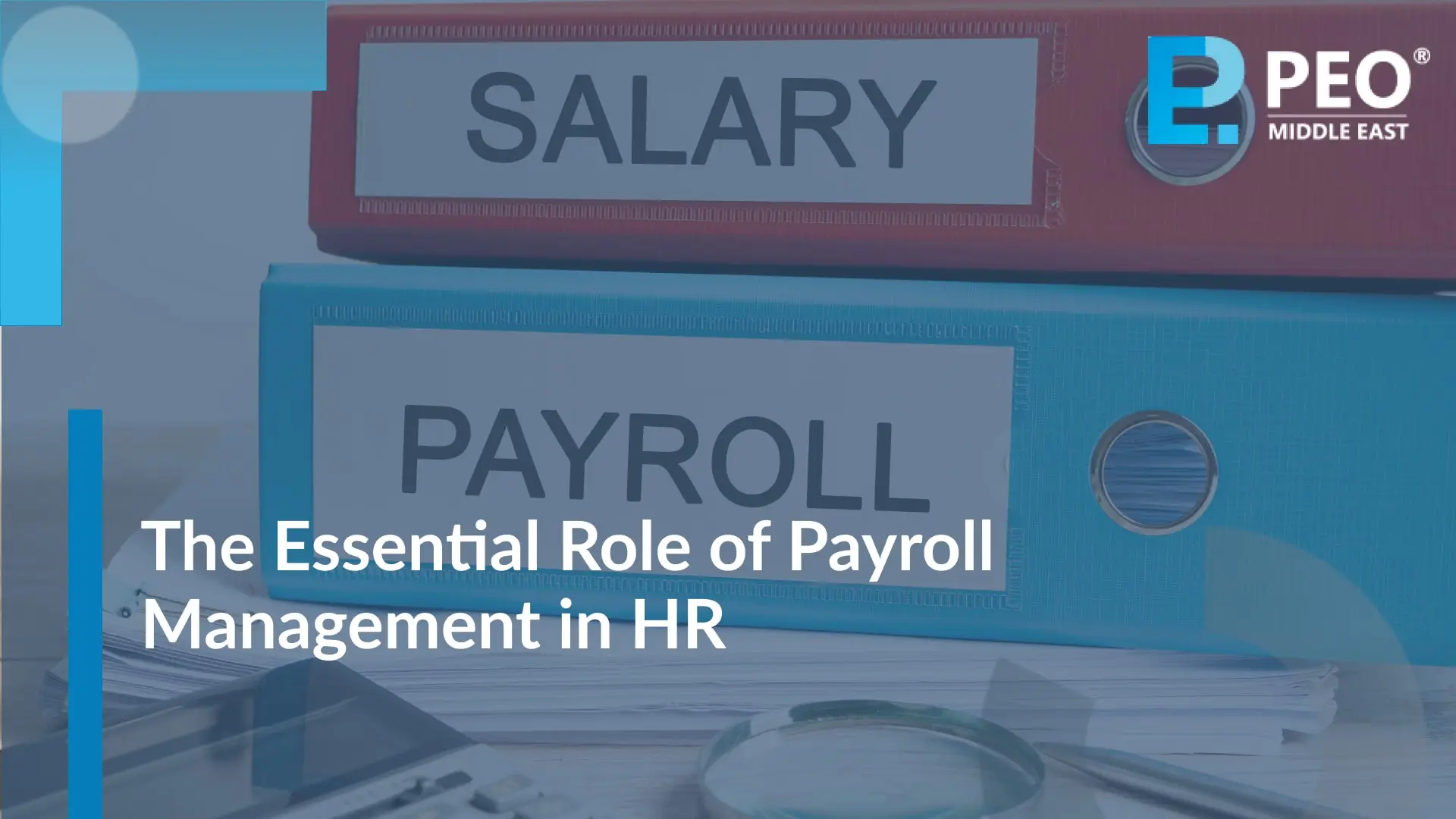What is the first thing that comes to your mind when you think of payroll?
For most of us, it’s a visualization of numbers on a spreadsheet. That’s the usual response we have gotten so far.
But payroll is much more than that. At its heart, it is a huge HR strategy behind employee satisfaction, legal compliance and business growth.
Integration of payroll management in HR ensures your business operates smoothly.
Take a look at the competitive business market. Companies are investing in the trust and well being of their employees. That’s why our article takes a closer look at how payroll management in HR is shaping the workforce. We cover the following points in our piece.
- How has payroll management revolutionized the dynamics among workforce?
- What makes up the backbone of HR?
- What has made payroll management so significant in recent times?
- What happens when payroll and HR join hands?
Payroll Management — The Backbone of Modern HR
In the past, payroll used to be seen as a back office function. Interestingly, we no longer live in that era. The modern workplace has seen payroll become an integral part of HR. Recruitment, retention, and employee satisfaction are directly influenced by it as well.
Integration of payroll management in HR is a reliable way to manage salaries, bonuses, deductions, and compliance with UAE labor laws. When done right, it checks off all these boxes.
- minimizes errors
- boosts employee trust
- reinforces the company’s reputation as an employer of choice
Why Payroll Management Matters More Than Ever?
In a globalized business environment, employees expect more than a paycheck. That’s why efficient payroll management in HR delivers value in many different ways.
1. Timely and Accurate Payments
Employees rely on their salaries for their financial stability. Delays and errors in payroll can lead to dissatisfaction and mistrust. Having these payroll systems guarantee your payments are timely and accurate. This, in turn, enhances employee morale.
2. Compliance with Local Laws
Payroll isn’t all about what the company pays. It’s also working with the local labor laws. For your business operating in the Middle East, understanding the legal obligations is quite important. Our employer of record UAE services simplify compliance.
3. Strategic Workforce Management
Beyond processing payments, payroll data provides insights into:
- workforce costs
- overtime trends
- productivity
This data helps your HR teams make informed decisions that are in line with your company’s strategic goals.
The HR-Payroll Nexus — A Game Changer for Employee Experience
When HR and payroll work hand in hand, the results are transformative. Your employees experience fewer errors, clearer communication, and faster resolutions to payroll related issues.
This synergy gives way to transparency. Employees who can access their detailed payslips, tax deductions, and overtime details feel more confident about their employer’s fairness and professionalism.
Partner with PEO Middle East as we handle your payroll, compliance, and HR functions under one umbrella. Our services free up internal teams to focus on core operations.
Major Components of Payroll Management in HR

1. Salary Calculations
Accurate calculations make up the foundations of payroll. This includes factoring in basic pay, overtime, bonuses, and deductions for taxes or benefits.
2. Compliance Monitoring
Payroll systems should be designed with local laws in mind. The gratuity calculations in the UAE and minimum wage requirements in Qatar need to be catered as well. Businesses using services of an Employer of Record UAE gain peace of mind because they know their compliance is handled by experts.
3. Employee Self-Service Portals
Modern payroll systems empower employees with access to their salary details, tax deductions, and leave balances. This reduces HR workload and increases transparency.
4. Tax Management
Payroll teams ensure that taxes are deducted correctly and submitted on time. This way, you avoid penalties. In the Middle East, where tax regulations vary, this is particularly important.
The Middle East Advantage — Payroll Management Simplified
Businesses operating in the Middle East face unique challenges. This is how payroll management in HR adapts to this dynamic region:
1. Centralized Payroll for Multi-Nationals
For global businesses with offices across GCC, centralized payroll systems provide consistency and efficiency. Partner with PEO Middle East to ensure your compliance and payments are handled across multiple countries.
2. Retention Through Competitive Packages
Payroll isn’t only following the regulations. It also consists of offering attractive compensation packages. Competitive salaries, benefits, and gratuity payments enhance retention and attract top talent.
How Technology Enhances Payroll Management?
Digital transformation has reshaped how businesses manage payroll. For HR teams, technology performs the following functions.
- manual errors are reduced
- processes are sped up
- actionable insights are provided
1. Automated Payroll Systems
Automation minimizes human errors. It ensures your employees’ salaries are accurately processed and on time. It also simplifies complex calculations, such as gratuity and overtime.
2. Real-Time Data Access
HR teams can access real time payroll data. They make it easier to track workforce costs and analyze trends. This supports strategic decision making and ensures compliance with labor laws.
3. Scalable Solutions
For businesses expanding in the Middle East, scalable payroll solutions are important. PEO Middle East offers you the flexibility to adapt payroll processes as your business grows.
Benefits of Partnering with a Payroll Expert
Outsourcing payroll to a reliable partner offers many advantages for businesses.
- Time Saving
- Compliance Assurance
- Employee Satisfaction
- Cost Efficiency
Building a Payroll Strategy for the Future
Having a strategy that focuses on compliance and employee satisfaction while being future proof is necessary. Role of payroll management in HR is going through changes. It makes the most sense that these strategies reflect that too.
1. Prioritize Employee Experience
Transparent and accurate payroll processes enhance trust and morale. Invest in self service portals and clear communication to build a positive work environment.
2. Leverage Data Analytics
Payroll data offers insights into workforce costs, productivity, and trends. Being strategic in usage of this data means that HR decisions are made in light of your business goals.
3. Embrace Digital Transformation
From automation to AI powered insights, digital tools simplify payroll management and enhance efficiency.
Redefining HR with Seamless Payroll Integration
Payroll is no longer just a transactional process. Now, it’s nothing less than a strategic function that directly impacts employee satisfaction and business growth. Integrating payroll management in HR creates a win-win scenario for companies. One where their employees feel valued and business operates successfully.
Empowering HR Teams with Outsourced Payroll Solutions

With solutions from PEO Middle East, your business gains access to geo specific expertise. This confirms compliance with local laws and maintains payroll accuracy. Outsourced payroll also offers scalability. These accommodate the growth of your workforce without the burden of internal restructuring. This partnership transforms payroll from a task into a simplified process.
The Future of Payroll Management: Trends to Watch
The payroll setup is constantly shifting, influenced by new and updated technology as well as changing workforce expectations. Trends including AI powered automation, blockchain for secure transactions, and data driven decision making are reshaping the way businesses approach payroll.
When your company integrates payroll management in HR, you need to keep up with these trends to ensure success in the long run. Automation reduces errors. Whereas predictive analytics offer insights into payroll patterns and cost forecasting. Businesses leveraging these advancements improve the employee experience. They set themselves apart in competitive markets like the Middle East.
Crafting a Payroll System that Supports Business Goals
Payroll is a strategic asset when it is designed effectively. A well crafted payroll system meets broader business objectives. This encompasses cost management, talent retention, and compliance.
These systems are built to handle cultural nuances and scale alongside the organization. From processing employee benefits to completing tax filings, a modern payroll approach supports immediate operational needs and your long term strategic ambitions.
Payroll and Employee Retention: The Hidden Connection
Payroll management is at the core of retaining top talent. Employees don’t only want timely payments. They want assurance that their compensation reflects their value. A transparent and efficient payroll management in HR system reinforces trust and increases levels of job satisfaction.
When employees feel valued through clear communication of their benefits, accurate payslips, and handling of tax and gratuity matters, their loyalty deepens. Payroll transparency helps overcome these disputes and creates a positive workplace culture. Employers in competitive markets often rely on Employer of Record UAE services to strengthen their payroll and retention strategies.
How Payroll Reflects Employer Brand
Your payroll practices speak volumes about your company’s values. A business that prioritizes error free, timely payroll shows its commitment to employee well being. Conversely, payroll mismanagement leads to dissatisfaction and tarnishes a company’s reputation.
Employees coming from varied cultural and professional backgrounds expect clarity and precision. Using services of PEO Middle East empowers businesses to establish themselves as trusted employers by ensuring consistent payroll practices across jurisdictions. This builds a reliable employer brand and it also enhances their market competitiveness.
Beyond Compliance: Payroll as a Strategic Growth Lever
A payroll management in HR system provides actionable insights that help businesses optimize operations. From understanding workforce costs to identifying patterns in overtime or absenteeism, payroll data offers valuable business intelligence.
With compliance and operational accuracy handled externally, HR teams can focus on initiatives that drive growth, such as workforce planning and employee development. This shift in focus positions payroll as more than a backend function. It wouldn’t be amiss to consider it a catalyst for your organizational success.
The Role of Payroll in Combatting Global Workforce Challenges
In an interconnected world, businesses often manage global teams with employees spread across multiple countries. Payroll for such teams can be complex, given the varying tax laws, labor regulations, and currency exchanges.
An Employer of Record UAE simplifies cross border payroll. That makes it easier for companies to expand their workforce without overburdening their HR teams.
Building Resilience with Scalable Payroll Solutions
Business environments are rarely static. Companies expand, contract, and pivot with market demands. Payroll systems need to be agile enough to adapt to these changes.
Partnering with PEO Middle East provides businesses with scalable payroll solutions. Whether you’re hiring in one country or multiple, these systems grow with your workforce. Scalable payroll handles expansion and accommodates changes in regulations. This helps businesses stay resilient in volatile markets.
Addressing Common Payroll Challenges
Even with advanced systems, payroll management can present challenges. Errors in data entry, regulatory updates, and managing employee expectations are some of the common issues faced by most HR teams. Outsourcing payroll minimizes these risks by providing access to specialists who are expert with labor laws and industry best practices.
Technology and the Human Touch: Striking the Right Balance
Automation and technology have revolutionized payroll. The human touch remains irreplaceable. Employees value personalized communication and support when it comes to their salaries, benefits, or deductions.
A modern payroll management in HR system balances automation with human oversight. While technology ensures accuracy and efficiency, HR professionals provide context, empathy, and solutions for payroll related concerns. This hybrid approach builds trust and improves employee satisfaction. It creates a harmonious work environment.
Payroll’s Contribution to a Resilient Workforce
Payroll is a reflection of a company’s values and its commitment to its workforce. Timely payments, transparent processes, and compliance with local laws create a solid foundation for employee trust.
Future-Proofing Payroll for Tomorrow’s Workforce
The evolution of payroll is far from over. Businesses must stay agile. They should adopt advancements that prepare them for tomorrow’s challenges. From AI powered insights to blockchain security, payroll solutions will continue to progress further and meet the needs of a tech savvy workforce.
With a strong emphasis on compliance, transparency, and employee experience, businesses in the Middle East can position themselves for sustained success. Viewing payroll as a strategic asset instead of a cost center will future proof your company’s operations. It will create lasting value for their employees and stakeholders alike.
Wrapping It All Up
The role of payroll management in HR has grown far beyond administrative tasks. It’s a driving force behind compliance, employee satisfaction, and organizational efficiency. Your business can turn payroll into a powerful tool for growth.
Contact us for our services





